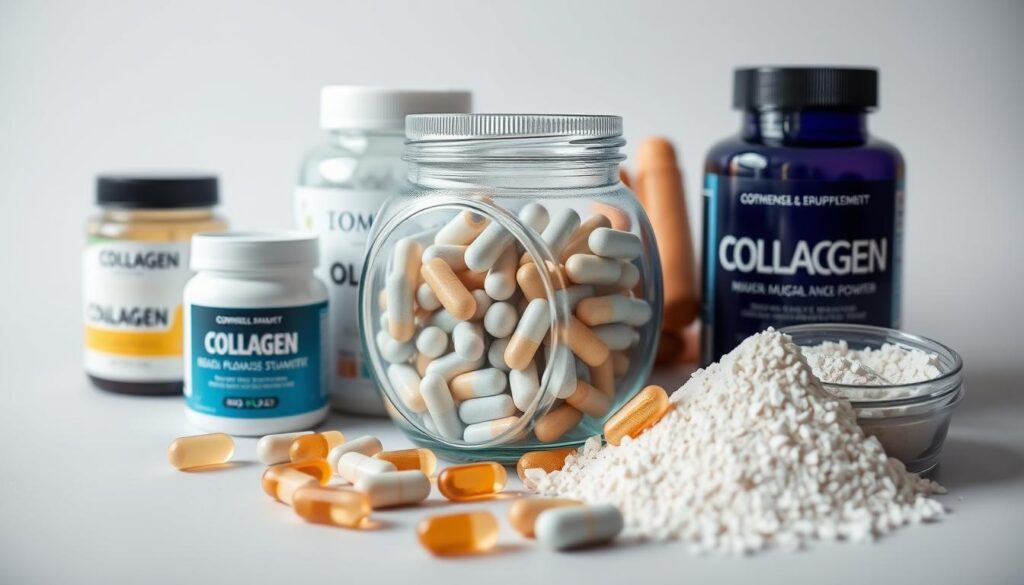Top 5 Collagen Benefits Backed by Science
Do you know how important collagen is for your health? It’s the most common protein in our bodies, helping our skin, bones, and connective tissue. But, as we get older, our bodies make less collagen, leading to wrinkles and joint pain.
Studies suggest that taking collagen supplements can help. They might make your skin more elastic, keep it hydrated, and improve joint health. But what are the main benefits of this protein?
Table of Contents
What Is Collagen and Why Is It Important?
Collagen is the most common protein in our bodies. It’s key for the health of our skin, bones, and connective tissue. It’s made up of amino acids like glycine, proline, and hydroxyproline. These help tissues stay strong and support repair and communication between cells.
The Structure and Function of Collagen in Your Body
Collagen is a vital protein with 28 known types, with type I being the most common. It keeps your skin, bones, and cartilage healthy. Its unique structure gives tissues strength and flexibility, helping them work well.
Natural Collagen Production and Age-Related Decline
As we get older, our collagen production drops, and what we have starts to break down. This leads to signs like wrinkles, joint pain, and less elastic skin. Knowing this helps us see why collagen supplements might help keep our skin and bodies healthy.
Supporting our natural collagen can help fight some aging effects. This is where collagen supplements come in. They offer a way to support our health and keep our tissues in better shape.
Understanding Different Types of Collagen
It’s key to know about the different types of collagen for your health. Collagen is a family of proteins, divided into several types. Each type has its own role in the body.
Type I, II, III, IV, and V Collagen Explained
There are at least 28 types of collagen, but Type I, II, III, IV, and V are the most studied. Type I collagen makes up about 90% of our collagen. It’s vital for skin health, giving it strength and structure.
Type II collagen is mainly in cartilage, which is key for joint health. Type III collagen is found in muscles, organs, and blood vessels. Knowing these types helps pick the right collagen supplement for your health needs.
Which Collagen Types Are Most Beneficial for Specific Health Concerns
Different collagens are good for different health issues. For example, Type I collagen is great for skin health and fighting aging. Type II collagen is often used for joint health.
By knowing which collagen types are best for your health, you can pick the right supplement. This way, you get the most benefits from your collagen supplement.
The Science-Backed Collagen Benefits for Your Health
Collagen supplements are getting more popular. It’s important to know how they work and their health benefits. These supplements are made from hydrolyzed collagen, which is broken down into smaller peptides. This makes collagen easier for the body to absorb.
How Collagen Supplements Work in Your Body
Collagen supplements give the body collagen peptides that boost collagen production. This can help improve skin, joint, and bone health. Research shows that collagen supplements help make more collagen. This is key for keeping connective tissue healthy.
Bioavailability and Absorption Factors
The bioavailability of collagen supplements is key to their success. Hydrolyzed collagen is absorbed better because it’s smaller. Studies show that collagen peptides get into the bloodstream. From there, they help support health in different parts of the body.
| Factor | Impact on Bioavailability | Effectiveness |
|---|---|---|
| Hydrolysis | Increases absorption | High |
| Peptide Size | Smaller peptides enhance absorption | High |
| Digestive Health | Affects absorption rate | Variable |
Benefit #1: Improved Skin Health and Appearance
Collagen supplements are great for your skin. As you get older, your body makes less collagen. This leads to wrinkles and dry skin. But, collagen supplements can help.
How Collagen Enhances Skin Elasticity and Hydration
Collagen peptides boost collagen in your skin. This makes your skin more elastic and hydrated. Improved skin elasticity means less wrinkles. It also helps your skin hold moisture better.
Collagen also helps make other important skin proteins. These proteins, like elastin and fibrillin, make your skin strong and firm.
- Improved skin hydration
- Enhanced skin elasticity
- Increased collagen production
Scientific Studies on Collagen for Reducing Wrinkles and Signs of Aging
Many studies have looked at collagen supplements and aging. They found that collagen can make your skin more elastic, hydrated, and wrinkle-free.
A study in the Journal of Medicinal Food showed collagen supplements reduced eye wrinkles in 8 weeks. Another study found collagen peptides improved skin in just 4 weeks.
These studies show collagen supplements can be good for your skin. They help reduce aging signs and improve skin health.
Benefit #2: Enhanced Joint Health and Reduced Pain
If you’re feeling joint pain, you might be interested in collagen’s role. Collagen is a key protein in our bodies, important for healthy joints. As we get older, our collagen production goes down, which can lead to joint problems like osteoarthritis.
Collagen’s Role in Cartilage Maintenance and Repair
Collagen supplements, like Type II collagen, help keep cartilage healthy. Type II collagen is crucial for cartilage. It helps maintain and repair cartilage, easing joint pain and improving function. Studies show collagen peptides can even help grow new cartilage cells, supporting joint health.
Research on Collagen for Arthritis and Joint Discomfort
Many studies have looked into collagen’s effects on joint health, mainly for osteoarthritis. A review on collagen Type II shows its benefits for joints. A study on collagen for joint pain found it greatly improves joint function and reduces pain.
| Study | Collagen Type | Findings |
|---|---|---|
| Research on Collagen for Osteoarthritis | Type II Collagen | Improved joint function and reduced pain |
| Clinical Trial on Collagen Supplementation | Collagen Peptides | Significant reduction in joint discomfort |
For more on collagen supplements, check out Should I Take Collagen?. It offers insights into collagen’s benefits and what to consider.
Benefit #3: Increased Muscle Mass and Strength
Collagen supplements can help increase muscle mass and strength, best when used with resistance training. As we age, keeping our muscles strong is key for health and movement. Adding collagen supplements to your workout routine might be a smart move.
Collagen Peptides and Muscle Protein Synthesis
Collagen peptides boost muscle protein synthesis, which is vital for muscle growth and repair. Muscle protein synthesis is how our bodies build new muscle proteins. This helps repair and grow muscle tissue. Studies show collagen peptides give the amino acids needed for this process, helping build more muscle over time.
A study in the Journal of the International Society of Sports Nutrition found athletes who took collagen peptides saw better muscle mass and strength. They were training as usual.
Clinical Evidence for Collagen in Athletic Performance
Many studies have looked at collagen’s effect on athletic performance. One study showed that collagen supplementation with resistance training led to more muscle strength than a placebo.
The table below shows key findings from recent studies on collagen’s impact on muscle mass and strength.
| Study | Duration | Collagen Dosage | Results |
|---|---|---|---|
| Journal of the International Society of Sports Nutrition | 12 weeks | 15g/day | Increased muscle mass and strength |
| Medicine and Science in Sports and Exercise | 12 weeks | 20g/day | Improved muscle strength |

More research is coming out, showing collagen supplements could be a great help for athletes and anyone wanting to boost their muscle health.
Benefit #4: Improved Bone Density and Strength
Collagen does more than just help your skin and joints. It also boosts bone density and strength. As we get older, our bones change, which can weaken them. But, research shows collagen supplements can help keep bones strong.
How Collagen Supports Bone Structure and Mineralization
Collagen is key to bone health, giving bones a framework for minerals like calcium and phosphate. Collagen supplements help by boosting osteoblasts, the bone-building cells. This can make bones denser and less likely to break.
The bones’ structure is complex, with collagen being a major part. Type I collagen, in particular, is crucial. It helps bones get stronger through mineralization. Taking collagen supplements might improve this process.
Studies on Collagen for Preventing Bone Loss
Studies on collagen supplements for bone health are encouraging. For example, they show that collagen can boost bone density in postmenopausal women. This is important because denser bones mean fewer fractures.
Here’s a closer look at how collagen affects bone health:
| Study | Participants | Duration | Key Findings |
|---|---|---|---|
| Collagen Supplementation for Postmenopausal Women | 100 postmenopausal women | 12 months | Increased bone density in the lumbar spine and femoral neck |
| Effects of Collagen on Bone Markers | 50 older adults | 6 months | Improved bone formation markers |
| Collagen and Calcium Supplementation | 200 elderly individuals | 12 months | Enhanced bone mineral density when combined with calcium |
These studies highlight collagen supplements’ benefits for bone health. They show promise in fighting bone loss due to aging.
Benefit #5: Heart Health and Blood Vessel Support
Collagen is good for your heart, improving blood vessel function. As we age, our blood vessels can stiffen. This can lead to high blood pressure and heart strain. Taking collagen supplements may help prevent this.

Collagen’s Impact on Arterial Strength and Flexibility
Research shows collagen peptides boost blood vessel strength and flexibility. Healthy blood vessels can better handle blood pressure changes. This reduces the risk of heart problems. Collagen supplementation may improve blood vessel function, keeping the vascular wall strong.
“Collagen supplements may be a valuable addition to heart health plans,” research suggests. They help keep blood vessels healthy, supporting heart health.
Research on Collagen for Cardiovascular Health
Studies on collagen and heart health are ongoing but show promise. Collagen supplements may lower blood pressure in people with high blood pressure. They also help keep blood vessels flexible.
A study in a respected journal found collagen supplements improved heart health markers. This suggests collagen could be a good addition to heart health plans.
More research is needed to fully grasp how collagen supports heart health. But, the current evidence suggests it’s a valuable part of heart health strategies.
Should You Take Collagen? Determining If Supplements Are Right for You
Deciding to take collagen supplements depends on your health and wellness goals. Collagen has many benefits, like better skin and joint health. But, whether it’s right for you depends on your personal situation.
Who Can Benefit Most from Collagen Supplementation
Some people might get more benefits from collagen than others. For example, those with joint pain or aging skin might see big improvements. Athletes or those who are very active could also benefit from its muscle support.
People who don’t eat enough collagen-rich foods or have certain health issues might also benefit. It’s important to consider these factors.
Potential Side Effects and Considerations
Collagen supplements are usually safe, but there can be side effects. Some might get stomach upset or allergic reactions. They could also interact with other medicines or make some health problems worse.
It’s crucial to talk to a doctor before starting any supplements. They can help you understand the risks and benefits. This way, you can decide if collagen supplements are good for you.
Collagen Dosage and Best Practices
To get the most out of collagen supplements, knowing the right dosage is key. It’s also important to know how to fit it into your daily life. Research offers insights on using collagen supplements effectively.
Recommended Daily Intake Based on Research
Experts say taking 2.5 to 15 grams of collagen daily is safe and works well. This amount can help with skin health and joint function.
The best amount for you might depend on your health goals. For better skin, you might need less. But for joint health, more might be better.
Timing and Consistency for Optimal Results
Consistency is key when taking collagen. To see benefits, keep taking it regularly for months. When you take it can also matter; meals or bedtime might help it absorb better.
To get the best results, add collagen to your daily routine. Try it in your morning coffee or a post-workout smoothie.
Conclusion: Making Collagen Part of Your Health Routine
You now know the many health benefits of collagen supplements. They can improve your skin, joints, muscles, and bones. By picking the right collagen and following the best ways to take it, you can add collagen to your daily routine wisely.
Studies show that collagen supplements are good for your health. They can be a great part of your health plan. Think about what you need for your health and talk to a doctor to see if collagen is right for you.
Adding collagen supplements to your routine can help you stay healthy and feel good. With its many benefits, collagen supplements are a simple way to be healthier and more vibrant.






